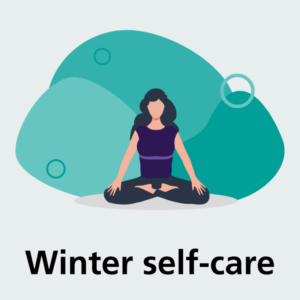What can I do to keep myself well over winter?
What can I do to keep myself well over winter?

With shorter days and colder weather, winter can be a challenging time for our mental health. It is common to feel down a bit more often, or to have less energy. Some people may experience Seasonal Affective Disorder (SAD), where they feel these symptoms more acutely. The added stress of COVID-19 can also intensify mental health problems.
Although changes to your mental health are very common during winter, there’s still plenty you can do to look after your wellbeing.
Ahead of World Mental Health Day (Sunday 10 October), we’re sharing some suggestions of things you can do to keep yourself well over winter.
Eating well
Maintaining a healthy diet can positively affect your mental health. Staying hydrated and eating regularly aids concentration and avoids low blood sugar, which can cause low moods, tiredness, and irritability.
Start the day with a wholegrain based breakfast for long lasting energy release (such as oats or brown bread). Try to include protein in every meal and get at least five fruits and veg a day. Not only can this improve your mental health, but it can also boost your immune system, preventing seasonal illnesses. It may also be worth cutting down on caffeine and alcohol.
Sticking to a healthy sleep schedule
Seasonal changes to our mental health can impact our sleep: either causing insomnia or constant tiredness. Maintaining a good sleep schedule is especially important for shift workers.
Try to get at least eight hours of good quality sleep per night. Go to bed at a regular time and relax and unwind before trying to sleep: things like yoga or meditation can help. If you can’t sleep, get out of bed, and do something else until you feel tired. Our staff Intranet page on sleep has lots of resources available, including advice for shift workers.
Build up emotional resilience
Resilience is your ability to withstand difficulties. It is common to feel stress at the thought of challenging times, and to assume that you won’t be able to cope. In these situations, it can help to think about challenging situations you have overcome in the past. Ask yourself if this will be worth worrying about in a week, a month, or even a year. The answer is probably not!
Exercise regularly
When it is cold and dark, it is easy for exercise to fall to the bottom of our priorities. Exercise releases endorphins which are ‘feel good’ chemicals and can boost happiness. Exercise can increase self-esteem and confidence while reducing stress and anxiety. Start slowly with something little and often, for example going for a walk or doing some gardening. Exercise works even better when paired with…
Getting some fresh air
Outdoor exercise that exposes us to sunlight is especially valuable as it affects the pineal gland which boosts mood. Although sunshine can be scarce in winter, spending time in nature is good for our mental health, whatever the weather.
Connect with others
Connecting and maintaining relationships with other people can have a big impact on our mental health. Even something as simple as sharing a meal with your family or chatting to your colleague on your break.
With many of us still working from home, it can be more difficult to connect with our colleagues. If you are missing this social connection, try to build time for it into your virtual meetings. Set aside the first or last 10 minutes of a virtual team meeting for some unstructured social chat.
Avoiding burn out
When you feel under pressure at work, it can be tempting to work harder than ever to try to improve things. It’s important not to overdo it, as this can lead to burnout. The trust encourages all staff to take their breaks. These are essential for rest and recharging during your workday. It is easy to cram in more appointments when you are working virtually. If you control your own schedule, try to allow time between appointments to combat ‘screen fatigue’, or speak to your manager if your workload is extending past your working hours.
Be compassionate to yourself
Above all things, going easy on yourself if the most important thing you can do for your mental health, whatever the time of year.
We’ll be publishing another World Mental Health Day blog on Monday, focussing on what your manager can do to support you. Click here for more info about staff wellbeing at NCH&C.
